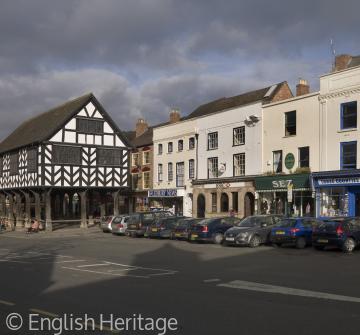Market Towns
 The market place and 17th century market house at Ledbury, Herefordshire
The market place and 17th century market house at Ledbury, HerefordshireNumerous British towns are distinctively urban because at some point in the medieval period they acquired market rights, usually by charter. Although many of those who were chartered at that time have been unable to sustain their markets, and are often today simply villages, others have from time to time joined the group. Even great cities such as Liverpool, Manchester, Birmingham, and Leeds were no more than small market towns in the early Middle Ages, while other places such as Newark and Oakham remain local trading and social centres much as they always have been. Although some markets date from the Anglo-Saxon period, the majority date from the population expansion of the period from the 12th century to the Black Death. 2713 royal charters for markets were granted between 1199 and 1483, although some of these were extensions or confirmations of existing rights. Many of the new markets did not survive the Black Death.
Markets needed market places, and many of these were laid out in the Middle Ages. In many cases the original plan can still be seen on the ground despite the fact that the surrounding buildings are likely to be Georgian, Victorian or even more recent, especially where banks, shops and public houses are the main featured buildings, often in different styles. Many still provide homes for a weekly market although in larger towns the venue for the market has often shifted because of traffic and other problems in the centre. In planned towns, mainly from the medieval period, market places were usually a central features whether square, rectangular or triangular. Burgage plots were paid out around the marketplace and adjoining streets with narrow frontages onto the best trading locations.
Over time, market places were encroached upon by ‘permanent’ stalls, perhaps better known to us as shops. Ludlow is a good example of a market place where the encroachment is clear on the ground, as is Ashbourne in Derbyshire, but there are no shortage of examples. Market crosses occasionally survive, although often in a modern rebuilt form, and market halls can be found in places such as Ledbury, Herefordshire. In the early days they tended to be timber-framed and to be raised on pillars which provided shelter for traders beneath. Although the number of markets has been in decline since the 14th century, there are still numerous towns which have not gone on to develop more substantive industrial and commercial roles, and can still most accurately be termed market towns, busier on the day or days in the week when they are entitled to hold markets, than at other times. Newark, Nottinghamshire, is a good example.









